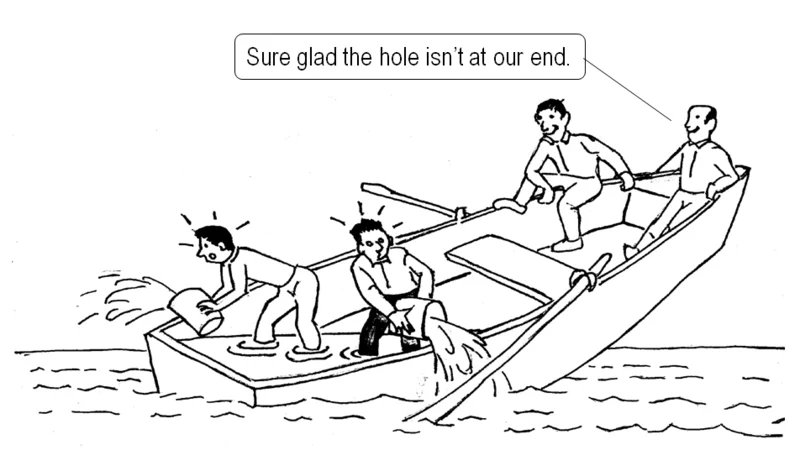By Mark Wolters
Perceptions of Sales:
One of the most interesting parts of our work is that we get to see various business leaders’ perceptions of sales and the people they have hired to fulfill it.
While we knew there were a lot of different perceptions, we were surprised to find out that there seem to be almost as many opinions about what sales is (and is not) as there are people! We very rarely find that 2 people in the room see sales the same way. While many of the opinions are healthy and allow for companies to make good decisions, others have the potential to be quite harmful to the growth they are after.
As you can imagine, depending on which person holds the perception – the impact on the business can vary quite a bit, and be quite dramatic.
Let’s take a deeper look at a few examples:
What makes a good sales person?
“Anyone who is good with people can sell.”
A company who holds this perception will likely invest in finding people who are charming. The more charming they come across during the interview process, the more likely they are to be hired.
At first glance, this path seems very logical. Salespeople usually do like to talk and are quite people orientated. Furthermore, charming people do seem to have a natural ability to build rapport which fosters trust. However, finding and securing revenue requires more than rapport and trust. Sales is a process that supports the customer buying journey.
As a result, having an internal system and experienced people in place who can properly guide a prospect through their entire buying journey requires someone who is organized, methodical, careful and pays attention to the details. All qualities that would have been minimized during the interview process if focusing on finding someone who is charming is the top priority.
On a practical level, companies influenced by this perception of needing a charming person in sales often find themselves feeling confused by unexpected shifts that prospects make in their sales process. They will often hear great things about early relationships that start off strong but fade over time. Unfortunately, this often leads to frustration with the person they hired – believing they just can’t do the job – and so, the hiring cycle starts all over again.
To offset your risks if you hold this perception, take some time to map out the entire journey your customer goes through to evaluate and purchase your products and/or services. Look for a sales resource who is charming and good at building rapport and trust, but who also aligns well with the things your customers will need along the way.
Are Salespeople are easily replaced?
This one is tricky because it is not one that gets said out loud very often. For obvious reasons, openly stating that a person they are hiring is easily replaced can be pretty deflating. Nonetheless, this is a perception that we have seen many business owners hold.
Customers have shifted quite dramatically over the last few years. They have been moving away from buying products and services to buying ‘solutions’ from someone who they believe can help them achieve their goals. The customer counts on the person they speak with (often the sales resource) to be a committed advocate for their priorities.
In many cases, they often spend months sharing their needs and hopes with these assigned company resources – and count on them to guide them to the right solution within the price they can afford to pay. To the customer, sales professionals are part of what they are buying. By thinking of sales resources as being easily replaced, there is an increased risk of removing one of the reasons the client was considering your solution.
This is not to say that the product or service is not important. Quite the contrary. However, they are only part of the customer buying cycle. Replacing ‘underperforming’ resources you hired too quickly may negatively impact the trust you were investing in.
This doesn’t mean that you must hold onto every person that you hire. Sometimes, it is just not a good fit. However, before you make the change – please pause and consider the whole situation around the person before trying to ‘swap them out’. It is not easy to swap out history, rapport or trust with a customer.

Should all Departments be Considered an Extension of Sales?
‘I’m not in sales. I have my own job to do.’
A company who holds this perception is also very likely to hold their sales team wholly responsible for generating sales for the company. Sales is not seen as something that needs to be focused on, or invested in, outside of the context of a sales department. If the company fails to achieve their revenue targets, it is seen as a failure of the sales team and their leadership.
Whether it be finance, developers, service teams or operations – staff at all sorts of companies often try to distance themselves as far as they can from the things ‘sales’ people are doing. The feedback we hear is that they just don’t feel comfortable talking with customers and have chosen their profession because it is far away from either doing sales or having to work directly with customers.
This perception really impacts the time, energy and training provided to staff outside the ‘sales’ team on how to support customers in their buying decisions. We highly recommend that you consider equipping your entire team (anyone who interacts with a customer in any way) to be trained on what sales is, and on what they can do to with regards to supporting customers through their buying journey. There is significant opportunity for a well-equipped employee base (regardless of their title) to have a dramatic impact on revenue.
While these are only three commonly held perceptions of sales we run across, by becoming conscious of what perceptions you have of sales in your own life, you may find it helps you evaluate the actions you are taking to grow revenue.
Good luck out there!
Mark
